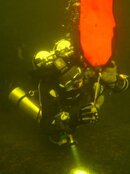Skulmoski
Contributor
I am new to diving but approach this activity from a risk management perspective informed from 15 years of mountaineering, ice climbing and rock climbing and an academic background. Risk management includes risk prevention and mitigation. When applied to diving, I think about the risks that could occur and then I think about ways to prevent the risk from occurring and if it does occur, what can be done to reduce the impact of the risk. I hope this type of thinking will serve me well in my recreational diving exploits.
"There are old divers and bold divers, but few old, bold divers."
GJS
"There are old divers and bold divers, but few old, bold divers."
GJS





